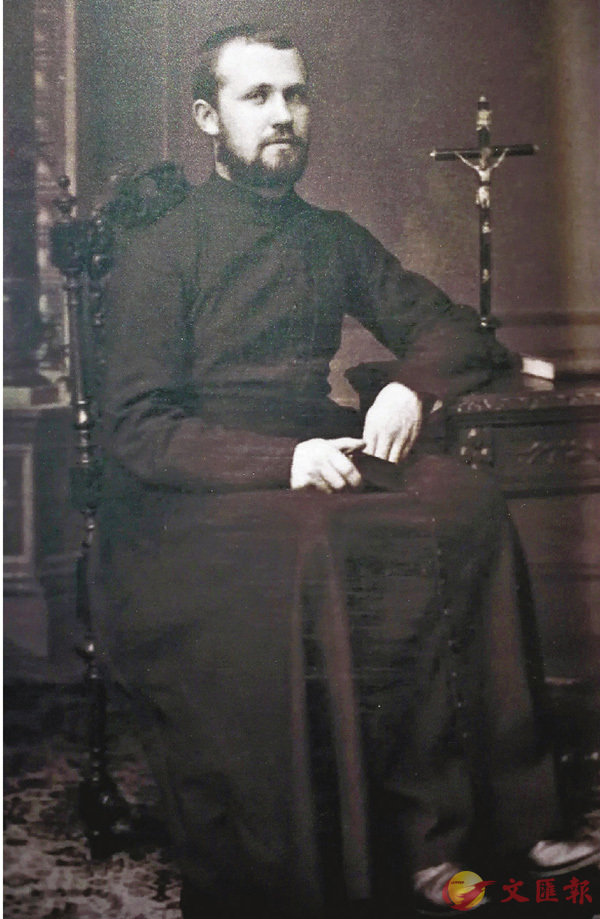The Origin of Yunnan small Coffee: a forest of careless beans in the birthplace of coffee in China

For professional baristas, please follow the coffee workshop (Wechat official account cafe_style)
Tian Deneng, a French missionary who planted the first coffee in Jukula.
113 years ago, a French missionary inadvertently introduced China's first coffee tree. It is incredible that the place for cultural exchange between China and the West, where coffee was first introduced and carried by coffee, is a Zhukula village whose name is "winding mountain road", and its name is "winding mountain road". It has been fragrant in this small mountain village between the deep mountains and valleys of Dali, Yunnan for more than a century. ■ Hong Kong Wen Wei Po reporter Ding Shuyong reporting from Binchuan, Yunnan
Zhukula Village is located in the northeast of Pingchuan Town, Binchuan County, Dali, in the depths of the mountains, surrounded by the Yupao River, a tributary of the Jinsha River. Yang Tiwu, a member of the staff stationed in the village, has the most say in the remoteness of Zhu Kula. it is not too much to describe it as "traffic basically depends on walking, communication basically depends on roar, and law and order basically depends on dogs." even if he entered the village three years ago, Yang Tiwu must ride a motorcycle from the county seat to the village committee and walk 7 kilometers of mountain road to enter.
This small mountain village in the deep mountain canyon has left a mysterious and ancient history of belief as a result of preaching, and because of a coffee seedling inadvertently planted by missionaries, it has given birth to the magical coffee custom in the deep valley, which has been performed for more than 110 years.
The offspring of the first tree introduced by French missionaries survive.
In 1904, Tian Deneng, a French Catholic missionary, went to Binchuan and nearby areas to preach. At that time, Zhang Yiqing, the "king of the Shunjiang River" in the Yupaojiang area, forcibly occupied the land and population, and the people were extremely indignant. The Yi people, Qi Ganwen, and others asked Tian Deneng to help with the lawsuit. After winning the lawsuit, Tian Deneng gained a lot of land and sowed the fire of Catholicism. The number of believers soon grew to hundreds, and the influence was widespread. Tian Deneng funded the construction of a Catholic church in the village of Zhukula and set up a church primary school for the sons of believers, where Western religious civilization and Chinese culture converge.
By 1949, except for a small number of areas such as Zhu Kula, other church primary schools were closed successively. Later, other missionaries and nuns were dismissed, and Catholic activities in Binchuan were terminated. The Jukula Catholic Church was accepted as a collective public house and no longer inhabited by believers and faculty.
What Father Tian Deneng did not expect was that a coffee sapling he had no intention of planting became the earliest coffee in China, and the coffee forest derived from it made Zhu Kula a "living fossil of Chinese coffee."
One day in 1904, Tian Deneng, a coffee lover, planted a coffee seedling from Bang Mei Shu in central Vietnam outside the back wall of the Chu Kula church. according to textual research, this is the first coffee tree introduced in China that does not produce coffee. From 1908 to 1912, 24 coffee trees survived; in 1948, the village head Li Fusheng mobilized the villagers to expand the cultivation of more than 80 mu of coffee, of which 67 mu were destroyed by the rare heavy snow at the end of 1983, and there were 1134 trees in 13 mu, which formed a coffee forest around Zhukula village.
Form the habit of drinking coffee and make it with a unique local method.
For more than a hundred years, the villagers have not formed the habit of praying and repentance every day, but drinking coffee every day has become a way of life. Whenever a guest comes to visit, serving a strong cup of coffee is also Zhu Kula's unusual way of treating guests. Yang Fucheng, who was met by a reporter from Hong Kong's Wen Wei Po at the entrance of Zhukula Village, although he is only 36 years old, has been drinking coffee for 30 years. He told reporters that drinking coffee in Zhukula is just a common thing, not about taste or elegance. Zhu Kula also uses an earth method to make coffee: pestle and mortar pestle and mortar, dustpan to dry, crushing and shelling, iron pot roasting, stone grinding into powder, and clay pot boiling.
Important Notice :
前街咖啡 FrontStreet Coffee has moved to new addredd:
FrontStreet Coffee Address: 315,Donghua East Road,GuangZhou
Tel:020 38364473
- Prev

New Australian study: people who like black coffee are likely to be psychopaths?
Professional baristas follow the Coffee Workshop (official Wechat account cafe_style) A study by an Australian university shows that people who like black coffee tend to have mental illness and sadistic personalities. In the study of 1000 adults, the researchers said that people who like black coffee have narcissistic, hostile, mental illness and sadistic personality traits. he
- Next

Drink coffee diuretic, easy to dehydrate? American Medical College: it doesn't hurt to drink this way.
Professional baristas Please follow the Coffee Workshop (official Wechat account cafe_style) have you ever heard of the saying that it takes 1.5 cups of water to prevent dehydration? There are many health messages often mention that caffeine in coffee and tea has a diuretic function, not only can not be used as a rehydration drink but may also lead to dehydration. To read the relevant literature, or even
Related
- What is the difference between Indonesian Sumatra Mantinin coffee and gold Mantinin? How to distinguish between real and fake golden Mantelin coffee?
- What does bypass mean in coffee? Why can hand-brewed coffee and water make it better?
- Unexpected! Ruixing Telunsu lattes use a smoothie machine to foam milk?!
- % Arabia's first store in Henan opens into the village?! Netizen: Thought it was P's
- Does an authentic standard mocha coffee recipe use chocolate sauce or powder? Mocha Latte/Dirty Coffee/Salty Mocha Coffee Recipe Share!
- What is the difference between Vietnam egg coffee and Norway egg coffee? Hand-brewed single product coffee filter paper filter cloth filter flat solution!
- What is the difference between sun-cured and honey-treated coffee? What are the differences in the flavor characteristics of sun-honey coffee?
- How to make Italian latte! How much milk does a standard latte use/what should the ratio of coffee to milk be?
- How to make butter American/butter latte/butter Dirty coffee? Is hand-brewed coffee good with butter?
- Is Dirty the cold version of Australian White? What is the difference between dirty coffee/decent coffee and Australian white espresso?

